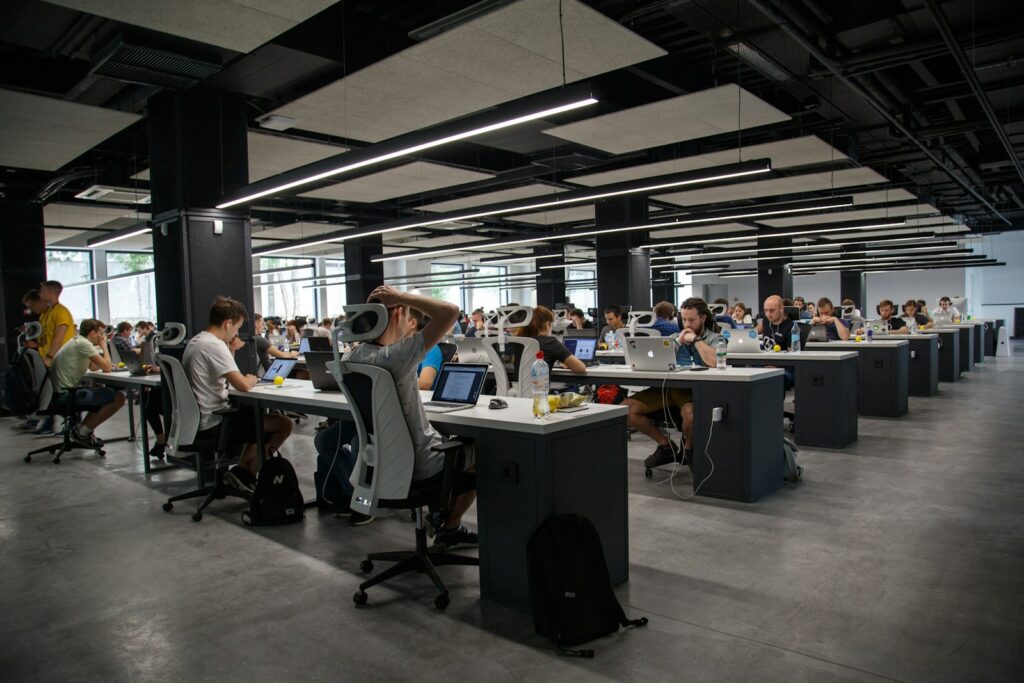Artificial intelligence is reshaping how people work, communicate, and grow professionally. What was once considered futuristic is now influencing hiring practices, workflows, and even the skills that define success. Rather than replacing human roles entirely, AI is transforming them by streamlining tasks, improving decision-making, and expanding creative possibilities. This shift is prompting professionals to adapt, learn, and embrace technology as a partner rather than a rival. Companies now value employees who combine human insight with technological fluency, making adaptability one of the most important traits for future careers. Here are ten workplace trends driven by AI that could shape your next job.
1. Increased Demand for AI Literacy

AI literacy is quickly becoming a universal requirement across industries. Employees are expected to understand how AI tools function, analyze data accurately, and use automation to boost efficiency. This does not require coding expertise but a strong grasp of how to work alongside intelligent systems. Professionals who can interpret AI results and apply them meaningfully to business goals are in high demand. As organizations rely more on machine learning and predictive analytics, understanding how to communicate insights from AI-driven data becomes an essential skill that enhances productivity and supports informed, ethical decision-making in everyday work.
2. Rise of Hybrid Human-AI Teams

Workplaces are evolving toward collaboration between people and intelligent systems. AI excels at processing data and handling repetitive tasks, while humans contribute creativity, empathy, and strategic thinking. This combination improves efficiency and innovation, as each complements the other’s strengths. For instance, AI might analyze customer behavior while a marketing team designs campaigns using those insights. Psychologists highlight that teamwork between humans and machines strengthens adaptability and critical thinking. Learning to collaborate effectively with AI systems is becoming a valuable skill, ensuring that workers stay relevant and thrive in environments where human judgment remains essential.
3. Focus on Creative and Strategic Roles

As AI automates repetitive tasks, employers are prioritizing positions that rely on creative thinking and complex decision-making. Jobs involving design, problem-solving, and leadership are gaining importance since they demand emotional intelligence and innovative perspectives that machines cannot replicate. Professionals are encouraged to sharpen their creative skills while using AI as a tool to enhance ideas rather than replace them. For example, AI can assist with research or analysis, allowing workers to focus on conceptual development. This shift ensures that human ingenuity remains central, fostering a workplace culture that values originality and strategic insight over mechanical efficiency.
4. Growth of Remote and Flexible Work

AI-powered tools have made remote collaboration easier and more efficient. Smart project management platforms, virtual assistants, and real-time communication software allow teams to work seamlessly from different locations. This flexibility benefits both employees and employers by expanding access to global talent and promoting better work-life balance. Machine learning also helps analyze productivity patterns, allowing managers to adapt workflows that suit individual preferences. As AI continues to improve virtual work environments, the concept of the traditional office becomes less central, leading to hybrid work models that offer more freedom, autonomy, and efficiency across industries.
5. Continuous Skill Development

AI’s rapid evolution requires professionals to adopt a lifelong learning mindset. Industries are changing quickly, and employees must regularly upgrade their skills to stay competitive. Many companies now offer AI-driven training programs that personalize learning paths based on performance and career goals. Workers who embrace continuous learning demonstrate adaptability and resilience, qualities highly valued in modern workplaces. Understanding new technologies, data literacy, and creative problem-solving are key areas of focus. Those who invest in developing these skills are more likely to thrive, as AI continues to transform job requirements and create new opportunities across diverse fields.
6. Ethical and Responsible AI Practices

The growing influence of AI has made ethical awareness a vital workplace priority. Organizations now focus on ensuring that AI systems are transparent, unbiased, and accountable. This emphasis has led to the rise of roles dedicated to AI governance, compliance, and data ethics. Employees are encouraged to understand the moral implications of using AI, such as privacy, fairness, and discrimination. Responsible AI practices build trust within organizations and with customers. Workers who understand ethical considerations in technology use can help prevent misuse, promote integrity, and support sustainable innovation that benefits both businesses and society as a whole.
7. Automation of Administrative Tasks

AI-driven automation has streamlined many routine responsibilities, such as scheduling, data entry, and report generation. This transformation allows employees to focus on tasks requiring critical thinking and creativity instead of repetitive work. While some fear automation may reduce job opportunities, it actually creates new roles centered on overseeing, managing, and improving AI systems. Professionals who learn to work effectively with automation tools can achieve higher productivity and accuracy. The shift toward smarter workflows benefits organizations by saving time and reducing human error, ultimately allowing employees to contribute more value through strategic and meaningful work.
8. Emergence of AI-Enhanced Recruitment

AI has revolutionized how companies hire employees by making recruitment faster and more data-driven. Intelligent systems now screen resumes, analyze candidate profiles, and even predict job performance. This process helps organizations identify top talent more efficiently while minimizing human bias when applied ethically. However, final hiring decisions still rely on human judgment and emotional awareness. Job seekers can benefit by tailoring their resumes for AI scanning systems and demonstrating adaptability during interviews. The combination of technology and human insight ensures that recruitment remains both efficient and fair in today’s evolving job market.
9. New Career Paths and Roles

AI has opened doors to entirely new professions that didn’t exist a decade ago. Careers such as machine learning specialists, AI ethicists, data annotators, and automation managers are now in high demand. Even traditional roles like healthcare, architecture, and education have evolved to incorporate AI-driven tools. This shift encourages workers to merge their existing expertise with new technologies, creating hybrid professions that combine human creativity with analytical precision. Those who explore these emerging opportunities can build dynamic and future-proof careers that align with the growing influence of artificial intelligence in every field.
10. Emphasis on Emotional Intelligence

In workplaces transformed by AI, emotional intelligence has become one of the most important human skills. Machines can analyze data, but cannot replicate empathy, understanding, or emotional connection. Employers increasingly value individuals who can communicate effectively, build relationships, and navigate change with compassion. Emotional intelligence strengthens teamwork, leadership, and decision-making qualities essential for balancing technology’s impact with humanity’s needs. Psychologists affirm that employees who display self-awareness and empathy foster healthier work environments. As AI continues to shape professional life, emotional intelligence ensures the workplace remains human-centered, collaborative, and deeply connected despite technological advancement.
Comments